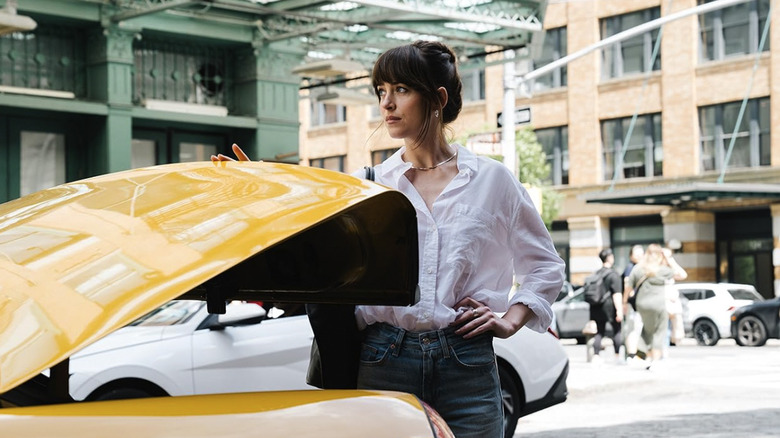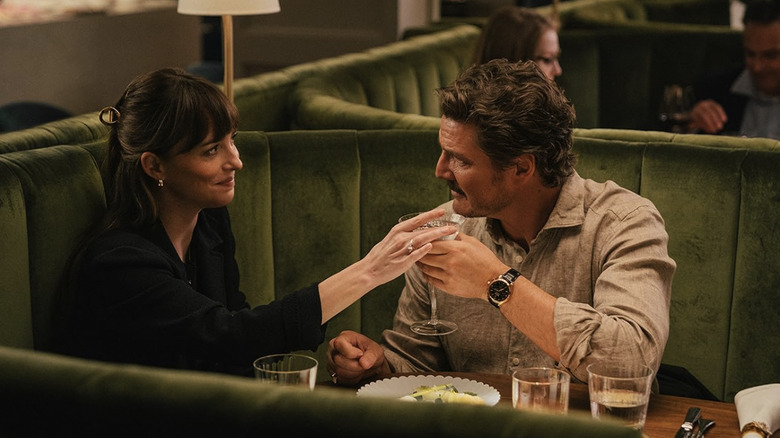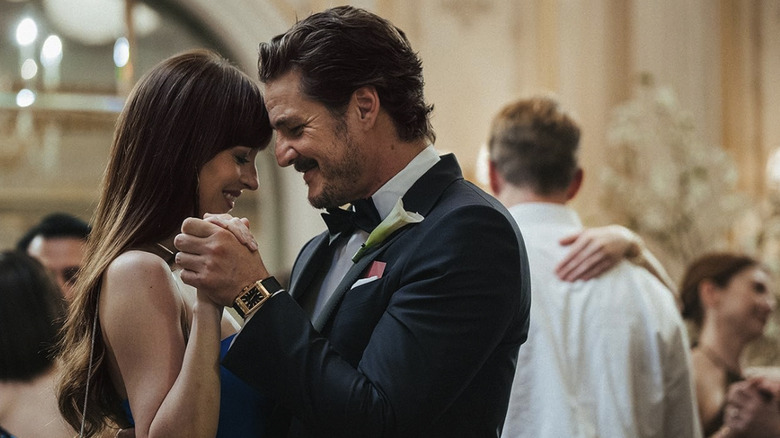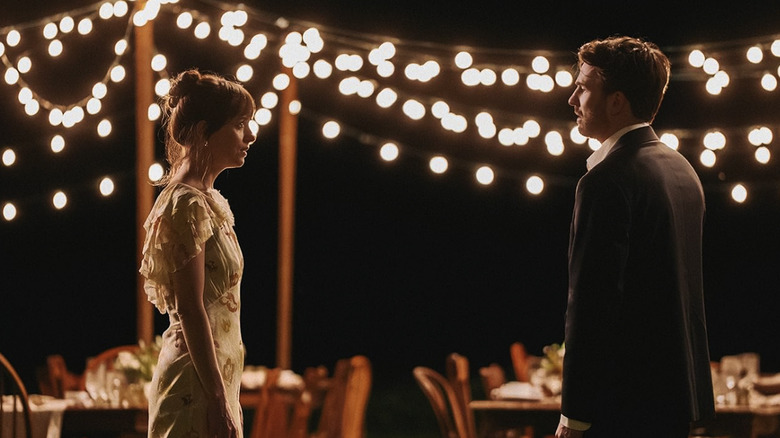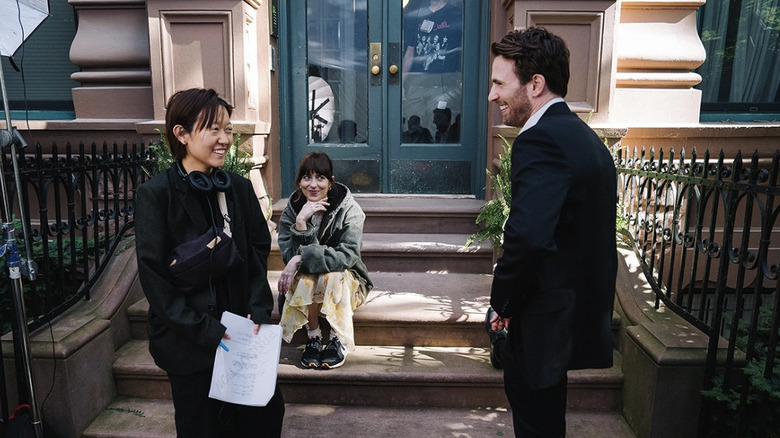Materialists Writer/Director Celine Song Reveals The Surprising Genre That Influenced The Film [Exclusive Interview]
After the aching yearning of 2023's "Past Lives," writer/director Celine Song is back with her second feature film, "Materialists." Despite there being some surface-level similarities between the two projects — they're both about a woman who is, in some ways, torn between two men — "Materialists" trades the soulful, wistful quality of her debut for something with a slightly harder edge.
Dakota Johnson plays a matchmaker named Lucy who deals with clients that speak in candid terms about the qualities they want in a potential partner, and that data-first mentality infiltrates Lucy's life to such a degree that when a charming, handsome suitor (Pedro Pascal) approaches her, she's not engaging with him as much as she's mentally running the numbers on the unlikelihood of a relationship. And when an ex-boyfriend (Chris Evans) re-enters her life, the brusque, no-nonsense Lucy slowly begins to learn that maybe not every relationship can be reduced to a series of checked boxes.
I had the chance to speak with Song this past weekend about how "Past Lives" prepared her for this film, her own experience as a real-life matchmaker, the movie's unexpected bookends, the surprising genre that informed the script's structure, and more.
Note: This interview has been lightly edited for clarity and brevity.
Celine Song put her own matchmaker history into Materialists
I'm so thrilled to speak with you because "Past Lives," your debut feature, was my favorite movie of 2023. So my first question is, was there anything you learned from that experience that informed your approach to "Materialists?"
Celine Song: Well, honestly, how to make a movie. [laughs] I feel like I did not know how to make a movie making "Past Lives," and I feel like "Materialists," I walked into it at least having made one movie. It's so holistic. And what that of course does is that it allows me to challenge myself more. Because I know more, so I feel like I end up asking more of myself and my team and my crew and my actors too, so I get a little greedy.
So Dakota Johnson's character Lucy is very blunt in this movie, openly talking about things that people think about a lot, but don't really verbalize: money, class, status, things like that. So what did it feel like to write for a character who says the things that similar characters might not actually say out loud?
Well, I feel like the relief that I think everybody feels in the audience when they hear the thing, the quiet part said out loud in some ways, about the way that we actually talk about love and dating ... because the truth is that it is very close to the way that I think we talk to our friends about it behind closed doors. Maybe you wouldn't say that in public. Maybe you wouldn't say that to your date, necessarily, or people who you care [what they think] about you. But the truth is, they will be very open about it, I think, with somebody who is a really intimate friend when it comes to dating.
As a matchmaker, I was in a position where I was getting to hear — because I worked as a matchmaker for six months — I actually ended up in a situation where people were very honest. So I actually heard really the nitty-gritty, the real, the blunt. So I think in that way, that's what really informed the way that Lucy speaks, because of this amazing relief we feel when we can say the part that we are all thinking.
Did you find yourself looking at people differently after you left that matchmaking job?
Oh, yes. I feel like I learned so much about people in general, and more than anything, where all of these feelings really come from. There's a repetition in the film of the word "valuable." I think because of the way the world is so intent on turning us into commodities and objects — there's a character in this movie who says, "I'm not merchandise, I'm a person." And I think that in that way, we are so often turned into merchandise of some kind, and we're asked to be merchandise for Instagram, for the world, everything.
And then the thing is, after all of that, I think we come back and then you have to actually ask the question, "Well, what was all this dating, this playing the game of value, for?" And it's like, "Well, it's all in pursuit of love." And it's a question of, "How are we going to get through the height, weight, salary conversation, and how are we going to get to the place where you're falling in love with somebody? How is that going to happen?" So I think that I learned so much about that disparity between the way we talk about the partner that we want to grow old with, and what it's actually like to grow old with somebody.
Materialists has some exceptionally unexpected bookends
That math-driven approach, it strikes me as not dissimilar to the way that studio executives might look at prospective movies, rating them by whether they check boxes instead of taking that holistic approach. In the wake of leaving that job, have you found that mentality applying to any other aspects of your life?
Well, I feel like it's a part of the whole world, don't you think? This turning things into algorithms? That's the main thing that we're dealing with. We just think that we can find answers by plugging things into an AI or going through a really sophisticated algorithm. I think there's so many things that you can find answers that way, but the one thing that I know you can't is love. Love is something that is so ancient. It's this thing that's very animal, in a way. So it's a thing where when I'm sitting in the same room with this person, I know I can do this forever. How could you quantify that? How can you find answers around that? So in that way, there's no point in objectification or the commodification of each other. And then it's really hard to find, after you've gone through so much dehumanization — "I'm not merchandise, I'm a person" — after you go through so much turning yourself into merchandise, how are you going to walk away being in love with yourself enough that you can be in love with someone else?
So I think that contradiction is the thing that really haunted me from the job as a matchmaker. So I wanted to make the movie.
The ancient quality you alluded to just now, did that inform the bookends of this movie, the time period and stuff like that? That was very unexpected. As the movie opened, I was not expecting this film to start in this sort of milieu.
Yeah. I love the idea. I mean, I always planned it that way. I wanted it to always feel like you walk in, and you're like, "I thought I came here to watch Dakota, Chris, and Pedro. What's happening? Why am I watching ancient people be in love?" But I think that's what I really want to talk about. I want to talk about how there's a record of stone tools passing hand to hand, moving from a place to another area, but what we don't know is what passed between people. I think about this when it comes to the very final shot of the film, which is the marriage bureau. There is a very material and a tangible record of marriages. One of the most reliable historical records — every historian will tell you, the most reliable record is a marriage record. That's how we find out so much historical facts.
But when you go through all the people who got married in history, you don't actually know if any of those marriages were abusive. You don't know if any of those marriages were amazing, the love of each other's lives. If one of them grew into love, if in one of them, everybody fell out of love. Who knows what happened? And, of course, not to mention queer love. There's no record of queer love for so many hundreds of years. And it doesn't mean that the love that passed between two queer people it's not as substantial or meaningful as in any of the marriages that are on the actual record. So to me, it's always about the gap between what is material and tangible, and what is spiritual, immaterial, and the thing that is completely ephemeral, like that [flower] ring.
Celine Song's theater background informs one of her frequent movie techniques
So this might be a silly question, but in both of your movies, there are scenes that feature pretty long takes of characters in conversation that are shot from the side, in profile. Where do those come from? Are you actively looking for opportunities to frame shots like that or do they just come up organically?
Well, I think that the main thing is there's something amazing about a two shot. Because then we get to actually experience what it is like to actually watch the two of them. The camera, in a way, gets to disappear. But I think that's something that I learned from theater. I think because I come from theater, I have a real interest in seeing not just the two shot, but also the environment [where] the two shot is happening. And by the way, I can only do this if the actors are incredible, have a theater background, and are able to do a whole scene like that. I don't need to think about coverage, because I can just put [the camera] there.
And usually in the edit, I'm just thinking about, "How long can I stay here before we go into the close-ups," right? "How long can I stay here?" And it's always a beautiful challenge because you get to see, "Oh, yeah, but I just know when we have to get closer." So to me, that's really how it works. It's somewhere between how amazing my actors are, how committed and how they show up to play, and also the way that I trust the power of a two shot where we're just sitting there just listening to two people talk to each other.
Materialists' writer/director says she looked to an unexpected genre for inspiration
I love it. So from a writing perspective, were there any tropes or archetypes that you were especially excited to either explore or subvert when you sat down to write the script?
Well, the truth is, and I talked to my department heads and I also talked to my cast about this the whole time, but the film is actually in the structure of a noir. So I think that I really looked more to the structure of noir than anything. So it's a person in a cynical job. In the first five minutes or so, you meet the client who changes your life. You may meet the case that changes your life, and then you see how it changes your life throughout the film. There is a femme fatale. There is a police chief. There is a partner that you trust. Those are kinds of archetypes that are actually playing out in this particular cynical job, which is as a matchmaker, right? It's [also] like, the city. It's the feeling of it.
And then, of course, when that transforms, there are moments where now he's falling apart in the alley. There's so many different ways that I think that the noir as a structure was something that informed us. And, of course, the noirs end [with] either you run away with the femme fatale, or you get a promotion. You run away from the law with the femme fatale, or you get a promotion. So I think in that way, those are the kind of tropes that I was actually looking to almost as much as I was thinking about the romantic comedy tropes. Where I think so much of that is about the longing, the fantasy. Some of those things are, of course, that's how you build this world of romance. But the actual hard structure of it, the archetypes of it, it's noir. [laughs]
That's fantastic. I never would've thought about that. But as soon as you said it, it makes perfect sense.
For real, though, right? You were nodding right away.
[laughs] All right, well, I think I'm out of time, but thank you so much, Celine. I really appreciate it.
This was so fun. Thank you so much. I loved talking to you.
"Materialists" is in theaters now.
